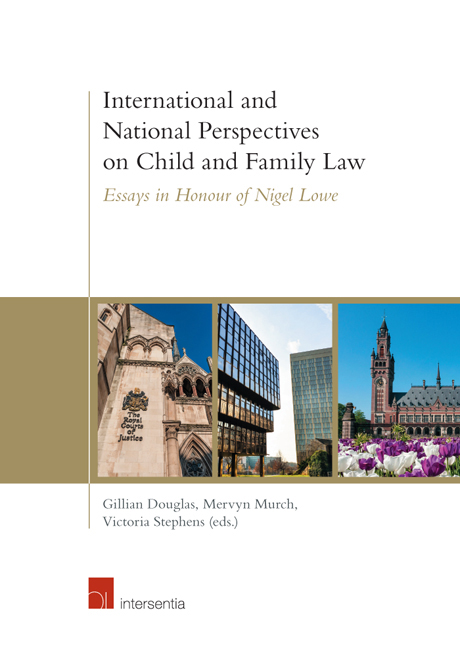Book contents
- Frontmatter
- Foreword
- Acknowledgements
- Contents
- List of Cases
- List of Contributors
- Introduction: Nigel Vaughan Lowe: An Appreciation
- Part I Family and Child Law in England and Wales
- Part II International Family Law
- Judging Parental Child Abduction: What Does it Mean to Adopt a Children's Rights-Based Approach?
- Judicial Activism: A 20-Year Evolution
- Globalisation of Adjudication in International Family Law: Serving International Families by Producing International Solutions
- Creating International Families: Private International Law and the Industry of Parenthood
- Issues in International Divorce Cases
- Non-Judicial Divorce in France: Progress or a Mess?
- The Istanbul Convention: Is Domestic Abuse Violence Against Women?
- Nationality and Migration Status in International Children's Law
- The Development of Child Protection Across International Borders for Children at Risk of Harm
- Nigel Lowe and International Family Law: An Immense Contribution
- The Spanish Constitutional Court and Protracted Child Abduction Proceedings: Time is of the Essence
- Non-Recognition of Child Marriages: Sacrificing the Global for the Local in the Aft ermath of the 2015 ‘Refugee Crisis’
- Juvenile Justice in Bulgaria: Reforms and Resistance
- Overriding Mandatory Provisions in EU Family Law Regulations
- Part III The Future for Family and Child Law
The Spanish Constitutional Court and Protracted Child Abduction Proceedings: Time is of the Essence
from Part II - International Family Law
Published online by Cambridge University Press: 12 October 2018
- Frontmatter
- Foreword
- Acknowledgements
- Contents
- List of Cases
- List of Contributors
- Introduction: Nigel Vaughan Lowe: An Appreciation
- Part I Family and Child Law in England and Wales
- Part II International Family Law
- Judging Parental Child Abduction: What Does it Mean to Adopt a Children's Rights-Based Approach?
- Judicial Activism: A 20-Year Evolution
- Globalisation of Adjudication in International Family Law: Serving International Families by Producing International Solutions
- Creating International Families: Private International Law and the Industry of Parenthood
- Issues in International Divorce Cases
- Non-Judicial Divorce in France: Progress or a Mess?
- The Istanbul Convention: Is Domestic Abuse Violence Against Women?
- Nationality and Migration Status in International Children's Law
- The Development of Child Protection Across International Borders for Children at Risk of Harm
- Nigel Lowe and International Family Law: An Immense Contribution
- The Spanish Constitutional Court and Protracted Child Abduction Proceedings: Time is of the Essence
- Non-Recognition of Child Marriages: Sacrificing the Global for the Local in the Aft ermath of the 2015 ‘Refugee Crisis’
- Juvenile Justice in Bulgaria: Reforms and Resistance
- Overriding Mandatory Provisions in EU Family Law Regulations
- Part III The Future for Family and Child Law
Summary
INTRODUCTION
There is no doubt that Nigel Lowe has decisively contributed to an improvement in the implementation of the 1980 Hague Child Abduction Convention. One of the main findings of the statistics he so efficiently elaborates for the Hague Conference on Private International Law, is that time is of the essence. It is well known that the six-week time-limit that the Hague Convention recommends in Article 11, is very oft en not met and that delayed return orders can be extremely difficult to enforce. Time, it is said, runs in favour of the abductor.
In a decision rendered on 1 February 2016, the Spanish Constitutional Court has apparently gone one step further. It decided that a return order may be in breach of the Spanish Constitution if it is delayed, the child is well-settled in its new environment, and this factor is not taken into account in the return proceedings. Whether the application was initiated swift ly has no relevance. What matters is the impact of time on the child, whose best interests should be paramount.
The present chapter, which is dedicated to Nigel Lowe in admiration and respect, seeks to explain and contextualise the Spanish Constitutional Court's decision. Contrary to what is generally assumed, the decision does not necessarily undermine the Child Abduction Convention, but is a further incentive for accelerating return proceedings and improving Spanish practice.
THE FACTS OF THE CASE
Even though it does not seem to play a significant role in the reasoning of the Constitutional Court, it is worth mentioning that in the case at hand, there were allegations of domestic violence. The Spanish mother was spending the summer holidays with the Swiss father in Greece, when there was a violent quarrel between the parents. The Greek police intervened. The mother and the five-year-old daughter then flew with the father's consent from Greece to Spain, to spend a few weeks with the maternal grandparents. The child was subsequently not returned to her place of habitual residence in Switzerland but stayed in Spain, where the mother claimed that she had suffered domestic violence throughout her relationship with the father.
In November 2013, three months aft er the child arrived in Spain, the father initiated return proceedings under the 1980 Hague Child Abduction Convention.
- Type
- Chapter
- Information
- International and National Perspectives on Child and Family LawEssays in Honour of Nigel Lowe, pp. 259 - 266Publisher: IntersentiaPrint publication year: 2018



